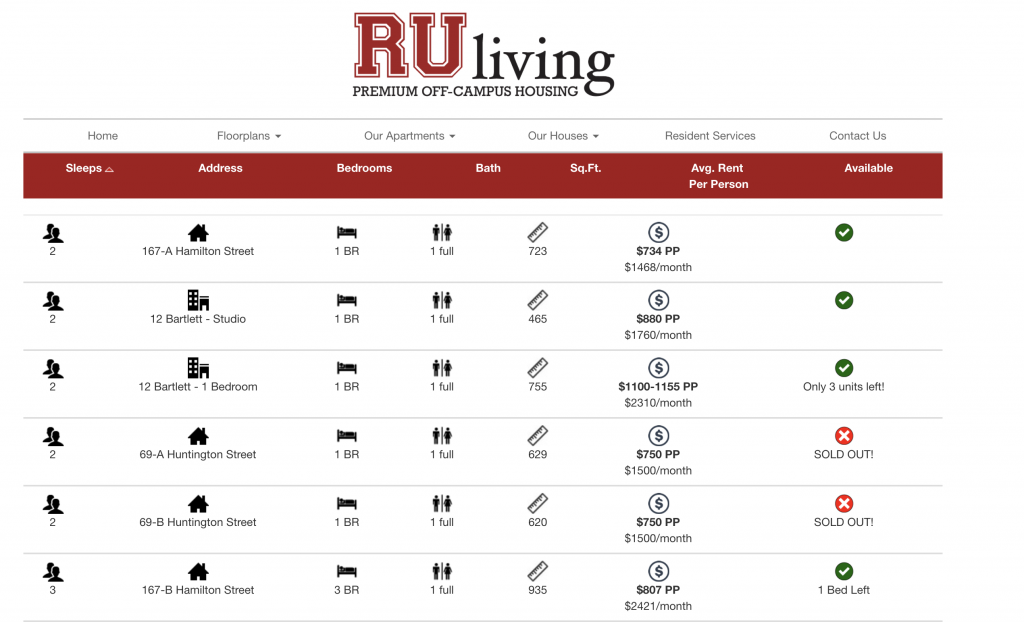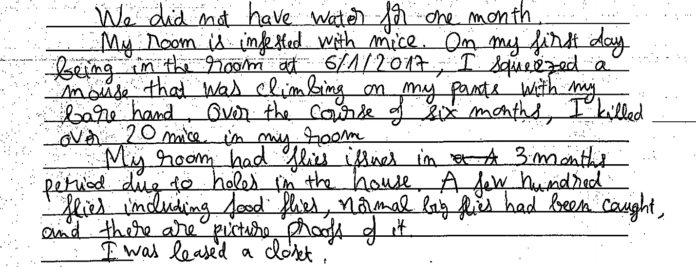Students and other renters feel forced into substandard, overpriced housing, while critics complain that the city agency charged with overseeing housing conditions and prices has failed to effectively protect them.
When Rose Bogina first toured her off-campus apartment, she was filled with hope and excitement. Here was an opportunity to move away, to find independence and to have her own space. The excitement quickly faded, though, when she noticed the apartment was infested with rodents, and she faced a landlord unwilling to fix the problem.
The critters, which Bogina presumes were squirrels, gradually bit through the ceiling above her bed, and peed on her carpet.
“I definitely think that as college students, we are being taken advantage of,” Bogina said. “The living conditions are okay, but they would not be adequate for a family.”
And Bogina is not alone. Julia Ferris, a Rutgers graduate student at the School of Social Work who has lived off-campus since her undergraduate days, has faced similar horrors. She once withheld rent in the dead of winter because her landlord refused to fix the heat — a violation of New Jersey state law.

College students across the country confront numerous problems with off-campus housing, with the market often dominated by big national real estate management chains that take advantage of unsophisticated first-time tenants. A Rutgers student I-Team found those problems are especially prevalent in New Brunswick, where landlords already wield much influence, given that 11,547 of the city’s 15,747 housing units are renter-occupied.
In the case of one major off-campus housing company, RU Living, public records obtained by the I-Team show that on several occasions, the firm has charged hundreds of dollars more for monthly rent than it was reporting to the city’s rent control office.
The New Brunswick City Rent Control Office: Missing in Action
The New Brunswick Office of Rent Control is supposed to monitor housing conditions and rental prices. But the I-Team found the board has been largely missing in action. The last time the board even met before November 2018 was March 27, 2018, even though rent control regulations require the board to hold meetings once a month unless “canceled for lack of business before the board.” During 2018, the board met a mere three times – the fewest number in recent years, and it has never met more than seven times in any year since 2012.
At Office of Rent Control meetings, tenant complaints are read aloud and addressed. Without these meetings, complaints are backlogged and not addressed for months. When asked about the infrequent meetings, Office of Rent Control Administrator Maria Cody said it is not always necessary to conduct a meeting to address landlord-tenant conflicts.
“So, many complaints come in, (and) sometimes they go to the landlord-tenant court, sometimes they go to a legal department because they’re not within our realm to handle, sometimes they’re mediated and sometimes they’re not true and they’re not within our purview to handle,” Cody said. “So lots of complaints come in, but they don’t always go before the board. Not always, sometimes there is just no business before the board.”
When it comes to overcharges on rent, rules are supposed to be enforced to prevent residents from paying too much. According to the Rent Control Office of New Brunswick, the allowable rent increase is around 2.5 percent per year, with the landlord only permitted to increase the rent at the start of a new lease agreement; the landlord is also required to fill out paperwork signifying the change. However, there are ways around this.
Rutgers Director of Off-Campus Living & Community Partnerships Kerri Willson said that some landlords do take advantage of college students, and are good at navigating ways to cut corners, sometimes without even raising the rent more than the allowed 2.5 percent. One example she gave is how some landlords will have properties zoned for five people but will rent them out to a group of 10 students. In situations like this, laws are broken and students are squeezed into a too-tight space.
“Where I see some of our students being taken advantage of is where there are landlords who are trying to bypass what the city regulates,” Willson said. “And so perhaps a house is zoned for six people, and the landlord is squeezing 10 into that space and charging each of those people over and above what the city is saying you can charge for that space. That does happen.”

At the end of the day, Willson said that some techniques landlords use to take advantage of students may not be directly illegal. But they can be ethically questionable. For instance, it is not illegal to make tenants pay the water bill for a property and then make them pay quarters to do their laundry, but it does raise ethical questions. Willson said that a majority of the complaints that she gets at the Off-Campus Living & Community Partnerships office have to do with issues surrounding that.
Another way around the limit on rent increases is a state exemption that allows for newly constructed buildings of more than four apartments to be exempt from rent control, though the owner still must register the rent with the city, and he or she should not be charging more than the registered rent. But, that means there are potentially thousands of units in newer buildings that are no longer covered by rent control, and can essentially adjust the rent to whatever they would like. In addition, this leads to the assumption that more recent apartment buildings will not be rent controlled and have higher prices, leading to a disadvantage to the low-income renters.
However, tenant complaint forms obtained through a city records request show there are many more issues being raised to the board. These are some examples of tenant complaints filed during 2018 with the Rent Control Board:
On February 28, 2018, a tenant on Jones Avenue claimed there had been a violation of the “Standards of Service” that landlords are contractually obligated to maintain during the term of a lease. The tenants claimed the residence lacked water for a month, and that their room was infested with mice. The filer said on the first day he moved in, he had to kill a mouse with his bare hands, as it was crawling up his pant leg, and has since killed over 20 mice in the room. The tenant also complained of flies in the residence due to holes in the house.
On May 9, 2018, a tenant on Hassart Street claimed a violation of rent overcharges. The tenant said that after living there for nine years, the landlord was attempting to raise the rent from $700 a month to $1,200. By law, the landlord would only be allowed to raise it 2.5 percent unless exempted — 2.5 percent would be $17.50. If the landlord was exempted from the rent control laws, the tenant would have had to have been made aware of that at least 30 days in advance.
On July 9, 2018, a tenant on Senior Street claimed a landlord attempted to raise the rent from $2,815 to $3,150. A 2.5 percent increase would be $70.37. In the complaint form, the tenant alleges that the change in rent was not made clear to any of the tenants and that the landlord had also used $833 from the security deposit of the residence to pay for the disposal of items which did not belong to them.
Among some 20 separate complaints, only one had any accompanying documentation that showed the Rent Control Board took action. Of course, it is unclear if the Rent Control Board handled the rest of the complaints, and documentation simply was not provided.
To avoid situations such as those documented in these complaints, some students may consider it safer to rent from premium housing off-campus organizations, such as RU Living and Premier Properties.
But, this option comes with an entirely different array of problems.
A Rental Company that Misleadingly Implies a Rutgers Affiliation
According to its website, RU Living provides premium apartments and newly renovated houses for Rutgers University students. Managed by Asset Campus Housing and owned by Sisler Real Estate Corp. President Michael Sisler, RU Living aims to provide living accommodations close to campus for students.

However, the company does not seem to always be honest with its tenants. In rental registration forms filed as of April 2018, there are several price discrepancies between the rates RU Living claims to charge tenants as reported to the city, and what tenants are actually paying. For example, 79 Huntington St. is registered with the city of New Brunswick as costing $7,453 per year, but on RU Living’s website, it is listed for $8,700. For 173A Hamilton St., the registered price is $2,755, but the listed price for tenants is $3,440 — and the list goes on.
In fact, RU Living is a prime example of the way rental companies take advantage of students and other New Brunswick residents.
In an undercover interview, an RU Living employee admitted that RU Living slightly alters the signature Rutgers “RU”logo to trick students. When asked if the company is affiliated with the University, the employee joked that the company simply put a white border around the logo, to trick students into thinking the University supports the organization. In the fine print, the company acknowledges that it is a private concern, and unaffiliated with Rutgers.
In addition, in the New Brunswick Zoning Board meeting minutes from Dec. 17, 2012, the proposed RU Living agreement was discussed. When asked if non-students would be allowed, Sisler, who founded RU Living, said they were. However, in the FAQ of RU Living and confirmed via interview, the organization says it exclusively rents to students of Rutgers University, and that outside residents are not permitted to sign a lease for any of the organization’s properties.
The lease itself for RU Living is problematic. A lease for an off-campus house obtained through a student interested in renting suggests that all liability for damages falls on the student renter. It says, in part:
“If such damage or destruction to the Unit was not the fault of Resident or Resident’s guests or invitees, Resident’s obligations under this Lease shall terminate if Landlord terminates this Lease or does not furnish Resident with similar accommodations within the Community. If damage or destruction of the Unit or its furnishings is determined to be the fault of the Resident or Resident’s guests or invitees, then Resident agrees to pay for all repairs and damages (including replacement costs) to the Unit beyond that attributed to normal wear and tear.”
This essentially means that if damage occurs in the off-campus space, even if not the fault of the resident, that the landlord is the person who can decide whether or not to terminate the lease. Furthermore, if the damage is found to be the resident’s fault — it is not stated how that is determined — then the resident must may for all costs, including fire damage.
“The housing lease for RU Living assumes zero responsibility of the landlord and puts it all on the tenant. The lease stated that any and all damage was the responsibility of the tenant to replace or compensate. So in the event of a fire, the tenant would be responsible for replacing the entire house,” Courtney Guinard, a fifth-year student at Rutgers University who almost rented through RU Living, said.
The lease is otherwise still riddled with additional costs and fees that, while not illegal, do seem questionable. For example, according to the Relocation Clause in the lease, tenants can be fined $200 for switching bedrooms with a housemate. However, the clause states that the landlord reserves the right at any time to move tenants to different bedrooms, or even completely different units, with only five days notice.
The lease also states that if the first month’s rent is not paid before the lease commences, all future installments of rent will be “automatically accelerated without notice and immediately to the extent allowed under applicable law.” What this means is that if first month’s rent is not paid by the time the lease begins, the landlord can immediately withdraw the remainder of a tenant’s rent right away.
These clauses, which, again, may not be illegal, certainly do raise ethical questions. On a college campus filled with first-time renters and students, clauses and terms like these beg the question of whether RU Living is attempting to take advantage of inexperienced students,
With most control of off-campus housing resting within the grasp of businesses such as RU Living and Premier Properties, students turn to landlords renting properties individually off-campus. While some of these landlords own individual single properties, many own entire blocks. For example, Bishop Investors owns the entire block of Bishop Street off-campus Cook, and Middlesex Medical Partners own a large majority of New Street.
This can result in a serious lack of care for tenants and their living conditions, and money-hungry landlords and students being taken advantage of. Willson said that while there are landlords with dollar signs in their eyes, there are also landlords that really care about community, and really want what is best for students.
“So I do think there are landlords who do have dollar signs in their eyes when they see college students, but that’s why this office is here,” Willson said. “We have a duty of care to our students, and so we’re working to sort of get those property owners to meet what our standards our for what they’re providing our students.”
Students Feel Mistreated
Despite the instances of landlords going above and beyond, some are taking advantage of a group of students and overcharging for rent, and not delivering services of appropriate quality.
In other instances, students complain about things that, while not necessarily illegal, are ethically questionable.
Guinard, who lives in an off-campus house near Cook Campus, says her landlord requires her to pay both the water bill every three months, and to pay quarters into the laundry machines. When she complained to her landlord, the landlord countered that the quarters paid for maintenance of the machines.
“(The landlord) sent me a whole, long financial email, like an economic breakdown of everything, and basically said he is charging for the convenience of having it there … I think he’s probably assuming that I don’t know that that’s weird, and that I’m not going to try to fight it,” Guinard said.
Willson argues that the landlord is in the right in this case. She said if tenants complain, the landlord can simply remove the machines, obliging students to use independent laundries.
In cases of lack of heat, or of rodents, students are encouraged to file a tenant complaint form with the City of New Brunswick Rent Control Office. However, with unaddressed tenant complaint forms piling up, some residents may feel discouraged. Willson argues that in a city with more than 57,000 residents, it can be hard to get the word out that tenant complaint forms exist.
At the end of the day, the responsibility for communication between landlord and tenant comes from both parties, Willson said. But students may feel that the city does too little to prevent landlords and companies, such as RU Living and Premier Properties, from preying on young students and inexperienced tenants.
“Since New Brunswick is largely comprised of college students with no experience leasing a home, the city should be doing more to ensure its college students are not being taken advantage of,” Guinard said.
With the Rent Control Office not meeting monthly as required, and Rutgers University apparently failing to step in on situations such as RU Living using the university’s branding to secure tenants, it is hard to see how the university is not enabling bad landlord behavior. This effect can trickle down to affect not only students, but permanent residents of New Brunswick too. For example, all properties owned by RU Living are inaccessible to the general public, limiting housing options for area families.
At the end of the day, residents like Ferris, Guinard, and Bogina believe their student status has been taken advantage of, and that the city of New Brunswick has turned a blind eye to landlord misbehavior. While landlords are required to file paperwork to raise the rent and have limitations on how much rent can be raised, unless errors are reported to the Rent Control Office, there is no way for the city to catch them. And with a city agency that refuses to meet monthly and address these concerns, the hands of the residents are tied.
For students and residents alike, that results in a toothless Rent Control Office, and allows landlords to find sneaky, and sometimes illegal, ways to take advantage of first-time renters – leaving renters with very few options for fixing this growing problem.


